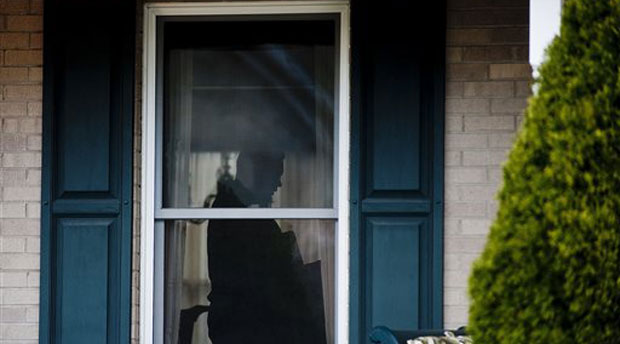
FBI and Murrysville police search the suspect’s house, who stabbed and slashed 21 students and a security guard at Franklin Regional High School, on Wednesday, April 9, 2014 in Murrysville, Pa. AP
MURRYSVILLE, Pennsylvania — The legal fate of the 16-year-old boy accused of stabbing or slashing 21 fellow students and a security guard at his high school will probably pivot more on his mental state than his tender age, attorneys say.
The sheer number of victims won’t preclude him from being treated as a juvenile, something that would assure his freedom by age 21, lawyers say.
Alex Hribal’s attorney is seeking a psychiatric evaluation and will seek to have his client transferred to juvenile court. To get the case moved, the attorney will have to show Hribal has a better chance of rehabilitation in the juvenile system than in adult court.
“Now once it’s determined what his mental health issues are, if any, that’ll go a long way in determining, I would assume, what a judge would do here,” said the attorney, Patrick Thomassey. “Why would a 16-year-old who has no history of anything just take two knives from a drawer and go to school and start stabbing people?”
Authorities say Hribal took the knives to the 1,200-student Franklin Regional High School in Murrysville, east of Pittsburgh, on Wednesday and randomly attacked other students in a crowded hallway just before the start of classes. The rampage stopped when an assistant principal tackled him.
Hribal is charged as an adult with four counts of attempted homicide and 21 counts of aggravated assault and could face decades in prison if convicted as an adult. Five students remained hospitalized Saturday, including four in critical condition, hospital officials said.
The boy’s family is just as puzzled as police about what triggered the attack, Thomassey has said. No evidence has surfaced that he was targeting any particular individual or that he was bullied.
He doesn’t appear to have a history of misbehavior or any known mental problems. But attorneys agree his mental health is likely to be central to the case.
Westmoreland County prosecutor John Peck said he doesn’t know what arguments his defense attorney plans to make. But, he said, “generally, mental health issues can play a large role in having the case remanded to juvenile court.”
Attorney Steve Colafella was an attorney for another western Pennsylvania boy, Jordan Brown, who was 11 when he was accused of killing his father’s pregnant fiancee with a shotgun as she lay in bed in 2009. His case was moved to juvenile court, and he was convicted. Now 16 and held in a juvenile detention center, Brown can be incarcerated or supervised on probation only until he is 21.
Prosecutors, Colafella said, could argue that with an older child such as Hribal, there’s less time for the defendant to be rehabilitated in a juvenile center.
The older the juvenile, the easier it is for prosecutors to argue that a child is nearing adulthood “and has already exhibited a degree of criminal sophistication,” Colafella said.
“The seriousness of the offense is obvious, and it’s a huge factor that’s going to weigh on the behalf of the DA’s office arguing this case should remain in adult court,” said Bruce Antkowiak, a law professor who is a former federal prosecutor and defense attorney.
“It’s not something where a person acted impulsively,” he said. “It’s something more symptomatic of a planned attack.”
RELATED STORY
US high school student’s stabbing spree injures 20